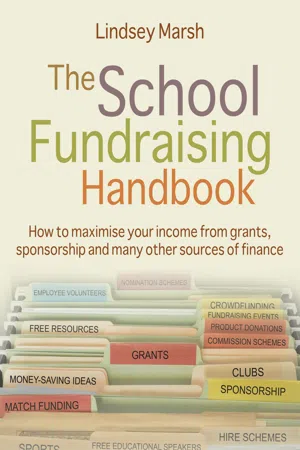
School Fundraising Handbook
How to maximise your income from grants, sponsorship and many other sources of finance
- 224 pages
- English
- ePUB (mobile friendly)
- Available on iOS & Android
School Fundraising Handbook
How to maximise your income from grants, sponsorship and many other sources of finance
About this book
Written by Lindsey Marsh, The School Fundraising Handbook: How to maximise your income from grants, sponsorship and many other sources of finance is a carefully compiled treasury of tips, tools and key contacts to help schools in the UK save money, boost their income and manage their fundraising projects.
It's exciting to know that there are hundreds of grants available to schools whether they're for funds needed to raise attainment levels, purchase new equipment, run school clubs or improve buildings and outdoor spaces and these grants can range from a few pounds to thousands of pounds! Plus, in addition to financial grants, there are also lots of other means of support out there too, such as business sponsorship and employee volunteers.
The School Fundraising Handbook aims to help schools become better informed about such opportunities, and to raise awareness of all the wonderful charities and organisations that are willing to support schools and other educational establishments such as nurseries, colleges, special schools and pupil referral units.
Covering grants, crowdfunding, event planning, recycling schemes, corporate support and much more, this indispensable guide throws schools a lifeline by revealing the abundance of fundraising streams available to them and sharing shrewd advice on how to coordinate specific projects and initiatives successfully.
Lindsey also uses her fundraising expertise to guide readers through the grant application process from start to finish, so that even the most inexperienced fundraiser can feel confident about seeing their projects through to fruition. Furthermore, she offers ideas and insights on how to fundraise through wider community involvement, reach out to business links and benefit from various other opportunities available to schools (e.g. hire schemes, guest speakers, free gifts and free site visits).
An invaluable resource for school leaders, school business managers and anyone involved in fundraising in the education sector.
Frequently asked questions
- Essential is ideal for learners and professionals who enjoy exploring a wide range of subjects. Access the Essential Library with 800,000+ trusted titles and best-sellers across business, personal growth, and the humanities. Includes unlimited reading time and Standard Read Aloud voice.
- Complete: Perfect for advanced learners and researchers needing full, unrestricted access. Unlock 1.4M+ books across hundreds of subjects, including academic and specialized titles. The Complete Plan also includes advanced features like Premium Read Aloud and Research Assistant.
Please note we cannot support devices running on iOS 13 and Android 7 or earlier. Learn more about using the app.
Information
Applying for Grants

Introduction to grants












Table of contents
- Cover
- Title Page
- Preface
- Acknowledgements
- Contents
- Part I: Applying for Grants
- Part II: Fundraising for Specific School Projects
- Part III: Additional Information
- Conclusion
- Copyright